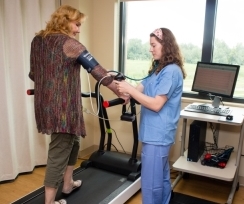5 Ways to Beat the Odds with Heart Failure
- Category: General, Cardiology
- Posted On:
- Written By: Scott Blois, MD
 The statistics on heart failure can be scary. About 6.5 million adults are now living with congestive heart failure (CHF), which means the heart is too weak to pump blood throughout the body. According to American Heart Association projections, more than 8 million people may join these ranks by 2030.
The statistics on heart failure can be scary. About 6.5 million adults are now living with congestive heart failure (CHF), which means the heart is too weak to pump blood throughout the body. According to American Heart Association projections, more than 8 million people may join these ranks by 2030.
As a board-certified heart failure specialist with 17 years of experience, I reassure my patients at Boulder Heart that statistics do not tell the whole story. For instance, it’s true that heart failure carries a survival rate of only 50 percent within five years of diagnosis – but that is the case when it is not treated correctly.

A customized treatment plan that includes the use of scientifically proven medicines to slow CHF progression and even reverse heart damage is the first step to improved health. After that, an important factor is attitude. Every day, my team and I are inspired by individuals who adopt a “can-do” attitude, actively embracing lifestyle changes that make a huge difference over time.
Top 5 Healthy Tips to Manage Heart Failure
If you smoke, get the support you need to stop. Smoking makes your heart work harder and is a strong risk factor for many things that injure the heart. It can damage blood vessels, reduce oxygen in the blood and make the heart beat faster. Ask your doctor about options, which include medications and support programs.
Eat a heart-healthy diet. Aim to eat a diet that’s focused on whole foods such as fruits and vegetables, whole grains, fat-free or low-fat dairy products, and lean proteins like chicken and fish. Try to steer clear of large servings of red and processed meats, alcohol and processed foods. The latter are often high in sodium that can worsen water retention and swelling in your lower extremities – common problems for CHF patients.
Keep active. Moderate aerobic exercise like walking keeps your body healthier, making it easier for your heart. Talk to your doctor before starting any new fitness program. Check with your local hospital to see if they offer a cardiac rehab program. For instance, Boulder Community Health (BCH) offers Boulder County’s only nationally accredited Cardiac & Pulmonary Rehab program with education and medically monitored exercise classes. To learn more, call 303-415-4852.
Take it easy to relieve stress. Research shows chronic stress can be a contributor to heart disease. It may worsen low-level inflammation over time – as well as raising blood pressure and other risk factors. Try taking a short daily nap, schedule in time to enjoy friends and family, and listen to soothing music while you focus on calming breaths.
Prioritize restful sleep. If shortness of breath is getting in the way of good sleep, prop your head up with pillows. If you snore or have other sleep problems, get tested for sleep apnea at a sleep medicine clinic, such as BCH’s nationally accredited Sleep Diagnostic Centers in Boulder and Broomfield.
The rising rates of CHF -- and the great potential to improve patients’ quality of life – has driven BCH’s commitment to founding Boulder County’s only dedicated heart failure clinic at Boulder Heart.
Our CHF team is proud to be a champion in treating all cardiovascular conditions but especially reducing the burden of heart failure in Colorado. We focus on co-managing with our patients, spending extra time on education about CHF diagnosis to patients and their families, and getting them on the right medications and lifestyle to live a longer, more energetic life. With this strategy, our success rate in treating CHF patients and keeping them out of the hospital is significantly better than the national average. Our favorite part of the job is educating patients to empower them to improve their own health and wellbeing.
To schedule an appointment with Dr. Blois, please call 303-442-2395.